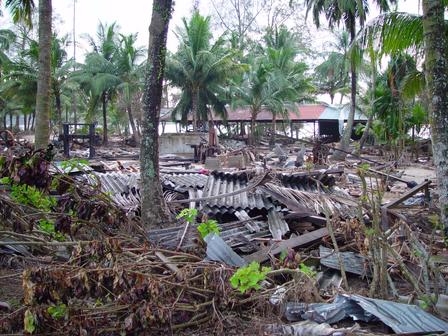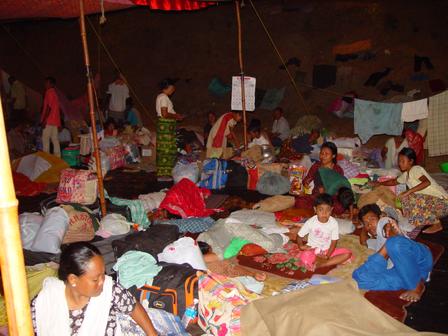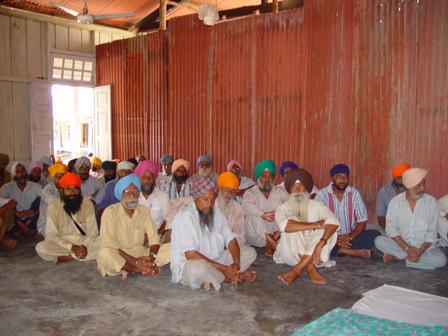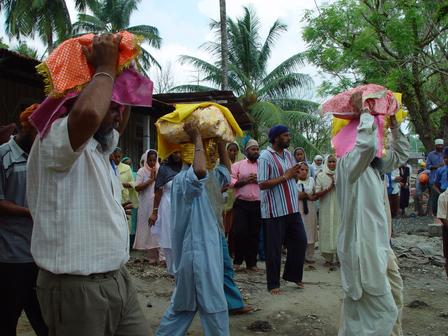UNITED SIKHS GHANAIA Tsunami - Project Coordinator, Gurmeet Kaur, Reflects on the Week That Was Since the UNITED SIKHS Team became the first non-governmental aid agency to arrive on the Nicobar Islands
First pictures from the Gt Nicobar islands - taken by the UNITED SIKHS team. UNITED SIKHS will update you as we receive reports. For Relief Team updates see: http://www.unitedsikhs.org/ghanaia/fieldreport.html.
There are more than 300 islands known as the Andaman and Nicobar Islands, in addition to Great Nicobar with its famous Campbell Bay, which are little known except that the government sent a group of Sikhs from the Panjab to settle there in 1969. They were given land to cultivate. But the Nicobar islands are coral islands where only coconut trees could grow . India needed to secure its claim to these islands when China also made a rival claim to them. Since that time, the Sikh settlers have cultivated them and built thriving communities in this remote and often forgotten area. They developed a notable infrastructure on the islands to serve the many fabrication industries, agricultural sites, and stores. So, in addition to making the area truly Indian by adding an Indian population to the indigenous tribes already there, the Sikhs brought jobs and a high standard of living to everyone.
A whole way of life was washed away by the Tsunami. Some of the islands lost literally all their inhabitants, while others had a few survivors. It is difficult to calculate the loss of life since for the last census, the government simply added a 10% increase to the population without making an actual count. Because of the remoteness of this area and the enormity of the situation, the government is finding it difficult to get relief materials to survivors in a timely manner. Army officials did visit Campbell Bay and told victims they would be receiving food and to stay calm, but that is becoming increasingly difficult for the locals since they have yet to receive even the most basic needs.

Photo 1. This used to be a home of a Sikh family in Great Nicobar
One hurdle to relief efforts in Campbell Bay is the lack of transportation to the islands. There is only one helicopter in service , which goes to the islands three days per week and can only carry seven passengers. Unfortunately, politicians assessing the situation have to use it leaving little room for civilians and volunteers. Ship access is restricted because the jetty lies destroyed. The authoroties are slow to increase the helicopter service and rebuild the jetty so that relief can get to the residents. The UNITED SIKHS' efforts are focused on coordinating air lift operations to get supplies from Chennai to Port Blair and then on to Campbell Bay, since ship transits take 10-12 days and there is still the problem of no jetty.
Bhai Esher Singh, project leader of UNITED SIKHS GHANAIA Tsunami Relief Project, finally reached Great Nicobar where most of the Sikh families are living in relief camps. Roads are completely washed out, and people have to tide themselves over by scavenging the few supplies left in the occasional abandoned houses that the Tsunami left standing. The people estimate that there were more than 5000 Nicobar casualties and thousands are in the relief camps. The victims have presented the Minister of Social Justice with a memorandum calling for the government to help in rebuilding the roads and community halls and rehabilitating schools, so that they can open as soon as possible. In addition, the community sorely needs new wells as the salt water has mixed with drinking water.
The UNITED SIKHS volunteer team estimates that immediate relief needs to come within the next two months; otherwise nothing will be able to reach the islands, especially Campbell Bay, because the monsoons will cut off the island from the mainland for 6 months. The 13 relief camps organized by the government are seriously congested (about 600 people share a toilet each) and characterized by poor hygiene and inadequate relief supplies. Health concerns are inevitable. Refugees include Sikhs, Christians, Hindus, and indigenous peoples. Their diet is poor and unhealthy. It is frustrating to have so many Sikhs, skilled in providing langar for the masses, unable to help because of lack of basic food and cooking utensils. Each refugee must get the signature of one single administrator assigned to ration food, yet, he is often called away to do inspections elsewhere. Tons of wheat and rice have been dumped and put under lock and key; a load of butter, milk, fruit, and jam was delivered to the area but has not been distributed in six days. Government efforts in so many areas at once seem to make it difficult to get the immediate help that these remote people need, and their frustration and unrest may present a new set of problems.

Photo 2. Survivors in relief camps- waiting for something to happen
Likewise, reconstruction is fraught with legal as well as logistical hurdles. The UNITED SIKHS have planned the organization of a sawmill to begin improving the temporary camps and reconstructing communities, but the government needs to assist in purchasing land on higher ground from private owners for the camps. The government has given permission to cut down trees for rehabilitation purposes. A special legal advisor is still needed to help deal with revenue records and claims, and a strong administrator is needed to handle the transportation problems mentioned before. The severity of the situation has made it difficult for the government to accurately estimate both the materials and forces needed to reinstate access to the islands so that relief goods can be brought to the victims who are starving and getting sick with each day that passes.
In addition to working with the survivors and volunteers to rebuild the communities, the proposed administrator needs the legal expertise to handle compensation claims. In general, there are two groups of Sikh victims. Those who want to resettle back in the Panjab and those who want to rebuild and resettle on the islands that had become their home. Those victims who wish to resettle back on the mainland have lost all their legal documents. The government is happy to let them leave, but proper compensation is still an issue for legal discussion. The victims feel that they settled on these islands as a service to the Indian government and should now be recompensed so that they can overcome circumstances beyond their control. They are concerned that the salty seawater has ruined the land for future cultivation in the lower areas and forests covering the hills are unsuitable for cultivation.

Photo 3. The Gurdwara - destroyed yet a place for solace
Once the sawmill gets established, however, a hardware supply warehouse will be set up close to the Gurdwara premises. The UNITED SIKHS can then form a team of carpenters to reconstruct houses. Wood cutting machines are needed as well as vehicles for transporting wooden planks. Motorcycles and bicycles are needed for laborers, and a project manager needs to be appointed. Environmental experts are needed to plan and execute the replenishing of forest and other natural resources. There is a special urgency to accomplish these goals because after mid-April before these islands will be totally cut off from the rest of the world. The only airstrip is under direct control of the Air Force and there is only one civilian helicopter pad. Malaysian Sikhs are ready to provide another helicopter when all the legal obstacles can be leveled. But time is running out.
Esher Singh plans to set up an office in Chennai to serve as a relief hub for the UNITED SIKHS operations. The list of basic needs grows: clothing, bedding, milk and wheat, hygiene and medical supplies. UNITED SIKHS have paid over 10,000 rupees per section (each section had 25 people) in the relief camps. However, there are still many camps neglected. The voice of these remote people is not reaching the media.
The Sikh families at Campbell Bay gathered at the Gurdwara to meet with the UNITED SIKHS team. Their main request was to get a floor rebuilt and have 6-10 tons of flour and daal delivered so they can begin serving langar. They also want to reestablish the Sri Guru Granth Sahib swaroop along with rumala and chandowa immediately. They were ruined by the Tsunami.

Photo 4. Sikhs taking the swaroops to 'Agan Bhet' or cremation
For the Sikh settlers who came to this area in service of their country, the relief efforts seem especially unrewarding. They gave their lives to building thriving economic and spiritual communities - all to honor and serve their government. Now they inhabit refugee camps, listening to their children cry from hunger and trauma; their place of worship is in ruins; their cries for help get bogged down in over-taxed bureaucratic processes. The team of UNITED SIKHS volunteers, though small in number, brings powerful expertise and networking skills to the task. But they, too, need the support of the outside world to keep their efforts strong and effective.
Please stay tuned for the proposed solution for long-term rehabilitation of the people of Campbell Bay and how UNITED SIKHS is going about it by visiting http://www.unitedsikhs.org/ghanaia/.
Contact: Gurmeet Kaur

